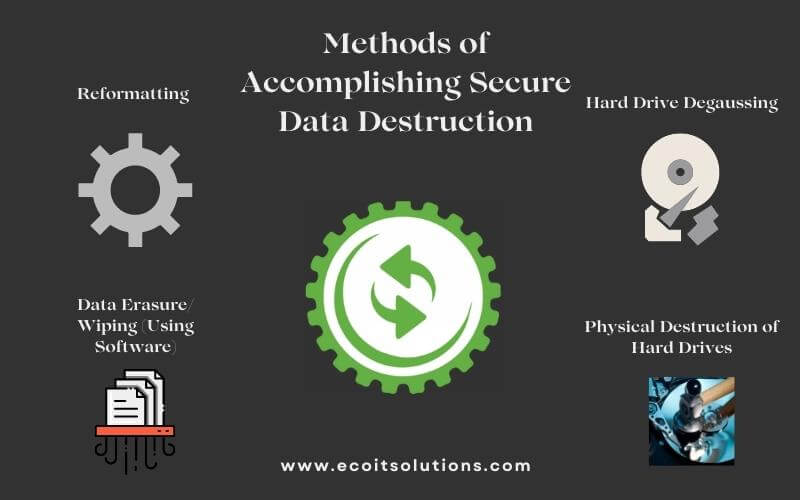Top Tips for Ensuring Secure Data Destruction in Your Cyber Security Plan
The Important Nature of Data Devastation in Upholding Computer System Safety And Security Solutions and Protecting Versus Unauthorized Gain Access To
In an age where data violations and identification burglary are significantly common, the value of reliable data damage can not be overemphasized. Various approaches, from data wiping to physical damage, offer as crucial safeguards versus unapproved access.
Importance of Information Damage
In an increasingly electronic globe, the importance of information devastation can not be overemphasized. As organizations collect large quantities of sensitive info, the potential repercussions of stopping working to appropriately manage and get rid of of that data come to be progressively extreme. Data violations, identification theft, and corporate espionage pose significant dangers, emphasizing the requirement of efficient information damage techniques.

Furthermore, as technology evolves, so too do the techniques whereby malicious actors seek to manipulate delicate info. Organizations must continue to be alert and positive in their information devastation strategies to secure versus these advancing hazards. By focusing on information damage, companies not just protect their possessions yet also foster trust fund among stakeholders and clients, demonstrating a commitment to responsible data administration and safety and security practices.
Techniques of Effective Data Devastation
To ensure the complete and irreparable damage of sensitive data, companies can employ a variety of efficient techniques customized to their particular requirements. One of one of the most common methods is information wiping, which entails making use of specialized software program to overwrite existing data several times, making recuperation essentially impossible. This is especially valuable for difficult drives and solid-state drives, where traditional removal methods are poor.
Another reliable method is degaussing, which utilizes solid electromagnetic fields to interfere with the magnetic domain names on storage media, making the data irretrievable. This technique is particularly matched for magnetic storage space devices, such as tape drives and hard drives.
Physical devastation is also a feasible choice, entailing the shredding, squashing, or incineration of storage gadgets. This approach assurances that data can not be recovered, making it suitable for companies taking care of very delicate details.

Conformity With Data Defense Rules
Organizations should not just focus on effective information devastation methods however additionally make sure conformity with information security regulations that control just how delicate information is handled and gotten rid of. Adhering to these laws is important for preserving and securing individual data consumer count on. Rules such as the General Information Security Guideline (GDPR) in the European Union and the Medical Insurance Transportability and Responsibility Act (HIPAA) in the United States impose rigorous standards on data management, which consist of requirements for the safe disposal of sensitive details.
To accomplish compliance, organizations must carry out detailed data destruction plans that align with these legal frameworks. This consists of identifying information that requires devastation, developing methods why not try these out for protected methodsâEUR" such as shredding physical media or using software program that meets market criteria for information wipingâEUR" and preserving thorough records of destruction activities. Routine audits must be performed to ensure adherence to these policies and to identify any potential locations for improvement.
Failure to abide by data security regulations can result in substantial lawful implications, including significant penalties and damages to an organization's credibility. Incorporating compliance right into data destruction practices is not just a legal obligation but additionally a crucial element of a robust info safety strategy.
Repercussions of Poor Information Handling
Poor information handling can result in extreme effects that extend past immediate functional problems. Organizations might face significant financial losses as a result of data violations, which commonly result in pricey removal initiatives, legal costs, and regulative fines. These economic effects can prevent and strain resources growth, eventually influencing a company's lower line.
In addition, bad information handling can significantly harm a company's online reputation. Partners, stakeholders, and consumers may shed count on an entity that falls short to secure sensitive information, resulting in decreased consumer loyalty and potential loss of this post company chances. This erosion of trust can take years to rebuild, if it can be recovered whatsoever.
Furthermore, organizations might face legal implications arising from non-compliance with data security regulations. Such infractions may cause penalties and examinations, intensifying the economic burden and more staining the organization's picture.
In the world of cybersecurity, insufficient information monitoring practices can produce vulnerabilities that make systems extra vulnerable to unapproved access and cyberattacks. Eventually, these repercussions highlight the crucial significance of carrying out robust data taking care of procedures to protect sensitive information and keep business stability.
Finest Practices for Secure Information Disposal


Firstly, data need to be identified according to its sensitivity. Sensitive info needs much more extensive disposal methods, such as shredding browse around this web-site physical papers and utilizing advanced software application for digital data cleaning. Employing certified information devastation services makes sure compliance with sector guidelines and standards.
Second of all, organizations should apply an information disposal policy that mandates routine audits. This plan must describe the treatments for information retention and devastation, guaranteeing that obsolete information is taken care of immediately and securely. Training employees on these protocols is necessary to cultivating a society of safety and security understanding.
Last but not least, keeping comprehensive documents of disposed information boosts accountability and supplies a clear audit path. This documentation ought to include the kind of data damaged, the technique utilized, and the date of disposal.
Final Thought
In verdict, the essential of effective data devastation appears in its role in improving computer safety and security solutions and alleviating unapproved gain access to dangers. Embracing robust techniques such as data wiping, degaussing, and physical devastation, along with compliance with policies like GDPR and HIPAA, is essential for securing delicate info. Neglecting appropriate data disposal techniques can bring about extreme consequences, consisting of data violations and legal effects. Executing finest practices in safe and secure data disposal eventually fortifies organizational integrity and customer trust.
In an era where information breaches and identification burglary are progressively common, the value of effective data damage can not be overemphasized. data destruction. Information breaches, identification theft, and business espionage position significant threats, underscoring the need of reliable data devastation techniques
Compliance with policies such as GDPR and HIPAA mandates that organizations apply rigorous information protection procedures, consisting of the secure destruction of data at the end of its lifecycle.
By focusing on data destruction, business not just secure their properties however additionally foster trust amongst customers and stakeholders, demonstrating a commitment to responsible data administration and safety techniques.
Organizations need to not only concentrate on efficient data devastation techniques yet additionally ensure compliance with data protection guidelines that regulate exactly how delicate info is managed and disposed of.